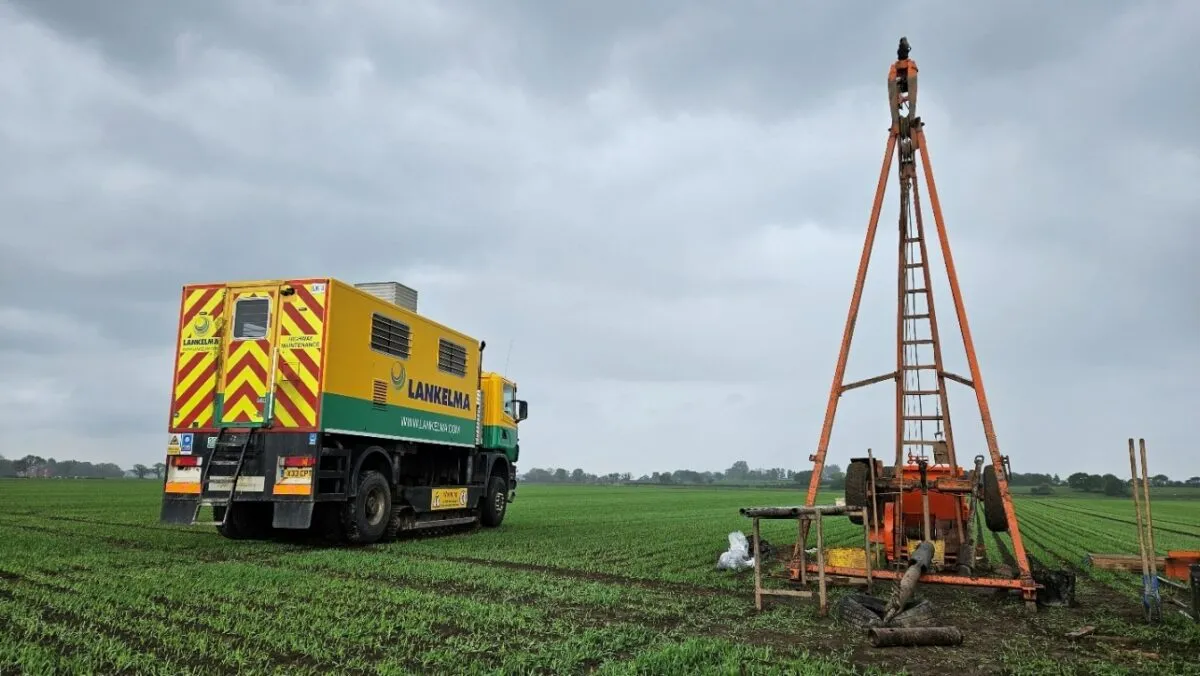Ground Investigation Survey: What You Need to Know

Before any construction project can move forward, there’s one essential question: What’s happening below the surface? A ground investigation survey helps answer that, providing the data needed to make confident, informed decisions about your development. These surveys are crucial in ensuring the success of construction projects by meeting regulatory and stakeholder requirements.
Skipping this step risks unexpected costs, delays, or worse—foundation failures. The ground investigation process is more than just good practice; it’s a critical part of delivering a successful build.
Introduction to Ground Investigation Services
What Is a Ground Investigation Survey?
A ground investigation involves examining the ground conditions at your site—what’s under the topsoil, how stable it is, and what risks it may pose. This includes everything from the type of soil and rock to groundwater levels, possible contamination, and more. Civil engineers play a crucial role in conducting these surveys to ensure accurate and reliable results.
These surveys are carried out by qualified ground engineers and geotechnical and geoenvironmental specialists. They use a range of ground investigation techniques to assess the site and ensure the development is safe, sustainable, and structurally sound. The data obtained from these surveys is essential for making informed design decisions.
What Does the Process Involve?
A typical investigation includes several key stages:
- Phase 1 Desk Study A review of existing environmental data, historical land use, and geology to flag early risks. Detailed assessments are often conducted to identify specific risks associated with the site.
- Preliminary Ground Investigations Site walkovers and early assessments to plan the next steps. Assessing drainage systems during these investigations is crucial for effective site planning.
- Intrusive Investigation Work Methods such as trial pits, boreholes, and in-situ testing methods (like cone penetration testing) are used to gather data below the surface. Environmental consultants often assist in these surveys to identify potential issues.
- Laboratory Testing Undisturbed samples are sent to a lab to determine soil strength, composition, contamination, and other key properties. An expert team ensures the accuracy and reliability of the gathered data.
- Reporting Findings are compiled into both a factual report and an interpretive report—the latter offering a detailed assessment of the site and clear engineering recommendations. Gathering field data is a foundational element in this process.
Further investigation may be required based on preliminary findings to ensure comprehensive site evaluation. Understanding ground conditions from a geotechnical perspective is crucial for the feasibility and safety of the proposed development. Ground improvement measures may be necessary to ensure suitable conditions for construction. Assessing groundwater conditions is also essential to identify potential hazards.
The interpretative report provides detailed analysis and insights based on the investigation results. Intrusive ground investigation methods are critical for accurate site assessment. Preparing a method statement ensures all health and safety standards are met before work begins. Obtaining samples through methods like coring and boring is vital for assessing the geological structure.
The choice of ground investigation methods is influenced by the proposed development and its specific requirements. Conducting a quantitative risk assessment helps identify specific risks and necessary remedial actions. Risk assessment is significant in identifying potential geotechnical and environmental hazards. Managing safety hazards during investigations is crucial for the safety of personnel and the public.
Site investigation is a critical step in assessing site conditions for construction projects. Unexpected ground conditions can pose significant challenges, requiring adaptive strategies to ensure project success.
Understanding Ground Conditions
Understanding ground conditions is vital for any development project, as poor ground conditions can lead to significant delays, cost overruns, and even foundation failures. Our ground investigation services include a range of techniques, such as cone penetration testing, rotary drilling, and trial pits, to obtain accurate and reliable data about the site’s soil and rock conditions, groundwater levels, and other environmental factors. Our team of expert ground engineers and geotechnical specialists analyzes this data to provide a detailed understanding of the site’s ground conditions, identifying potential risks and hazards, such as slope stability issues, contamination risks, and unforeseen ground conditions.
The Ground Investigation Process
The ground investigation process typically involves a phased approach, starting with a phase 1 desk study and site walkover survey to gather initial information about the site’s geology, hydrology, and former usage. This is followed by a preliminary ground investigation, which may include trial pits, boreholes, and other intrusive investigations to gather more detailed data about the site’s ground conditions. Our team of experienced geotechnical and geoenvironmental specialists designs and manages the investigation process, ensuring that all relevant industry standards and regulatory requirements are met. We provide comprehensive and accurate ground investigation reports, including interpretive reports and factual reports, to support informed decision-making throughout the construction process.
Role of Ground Engineers
Ground engineers play a critical role in the ground investigation process, providing expert advice and guidance on all aspects of ground conditions, from initial site investigations to detailed design and construction. Our team of experienced ground engineers has extensive experience in geotechnical and geoenvironmental engineering, providing a comprehensive understanding of the site’s ground conditions and potential risks. We work closely with clients to design and implement effective ground investigation strategies, ensuring that all relevant data is collected and analyzed to support informed decision-making. Our ground engineers are skilled in a range of techniques, including geotechnical investigations, laboratory testing, and data interpretation, providing high-quality advice and guidance throughout the construction process.
Checklist: Planning a Ground Investigation ProcessGet the best results from your ground investigation services by preparing your site in advance.
Ground Investigation Planning Checklist:
- Site location, layout, and boundaries
- Access for drilling or excavation equipment
- Existing reports, service plans, and site history
- Project timeline and construction schedule
- Known or suspected contamination
- Type and scale of proposed sub surface structure
- Professional qualifications and memberships, such as those with the Geological Society
Real-World Examples of Trial Pits
Case 1 – Soft Ground Discovered In a city centre commercial build, soft ground beneath the surface wasn’t identified in early plans. The ground investigation report revealed low bearing capacity, allowing the team to switch to a raft foundation—saving time and money during construction. The interpretative reports provided detailed analysis and recommendations, ensuring the foundation design complied with British and Eurocode standards.
Case 2 – Unknown Obstruction Avoided At a residential site, a trial pit uncovered buried concrete slabs from a former industrial use. Early detection avoided expensive delays and redesigns later in the ground investigation works.
What Can Go Wrong Without a Proper Survey
A rushed or skipped investigation can lead to serious consequences:
- Delays due to unforeseen ground conditions
- Incorrect foundation design, leading to foundation failures
- Missed contamination risks that could halt construction
- Non-compliance with regulatory authorities and planning conditions
- Poor drainage design, particularly in areas with high groundwater levels
- Failure to prepare a method statement, compromising health and safety standards during ground investigations
Compliance with Regulations and Standards
Compliance with relevant regulations and standards is essential for any ground investigation project, ensuring that all works are carried out safely and to the required standard. Our team of experienced geotechnical and geoenvironmental specialists is familiar with all relevant industry standards, including those related to health and safety, environmental protection, and geotechnical engineering. We ensure that all ground investigation works are carried out in accordance with relevant regulations and standards, including those related to planning conditions, regulatory authorities, and environmental data. Our comprehensive ground investigation reports and interpretive reports are designed to meet the requirements of regulatory authorities, providing accurate and reliable data to support informed decision-making throughout the construction process.
Tailoring the Advice to You
For Developers: Understanding your project requirements upfront ensures fewer surprises. Reliable geotechnical investigations reduce cost uncertainty and help meet planning deadlines. The proposed development can significantly influence the choice of ground investigation methods suited for your specific site and its geological conditions.
For Contractors or Site Managers: A full investigation informs excavation depth, safety plans, and construction sequencing. It helps you work efficiently with accurate data.
For Engineers or Consultants: Use the survey results to design stable sub surface and surface structures, ensure compliance, and meet relevant industry standards.
FAQs: Ground Investigations
Q: How long does a ground investigation take?
A: Anywhere from a few days to several weeks, depending on site size, complexity, and the scope of work.
Q: What’s the difference between a factual and interpretive report?
A: The factual report presents raw test data. The interpretive report offers expert conclusions and recommendations for design and construction.
Q: Is a desk study enough?
A: A Phase 1 desk study is an essential starting point, but for most sites, intrusive investigations and laboratory testing are needed to build an accurate understanding of the conditions.
Q: Can I reuse old data from nearby sites?
A: It’s risky. Even neighbouring plots can have very different soil and rock conditions, especially with changes in land use or drainage.
Q: Why is a quantitative risk assessment important in ground investigation services?
A: Conducting a quantitative risk assessment is crucial as it helps identify specific risks through laboratory-tested geotechnical and environmental samples. This assessment determines necessary remedial actions, ensuring the safety and stability of the site.
Final Word
A ground investigation survey isn’t just about ticking a box—it’s about understanding the ground beneath your feet. Done properly, it gives you reliable, high quality data that shapes everything from foundation design to drainage to compliance with regulatory authorities. Ground investigation surveys are crucial for informed decision-making in construction projects, enabling effective risk management and ensuring adherence to regulations.
Put simply: if you want to build right the first time, this is where you start. For support with planning or carrying out your investigation, Ibex Consultant offers practical, no-nonsense expertise built on years of geotechnical experience.




